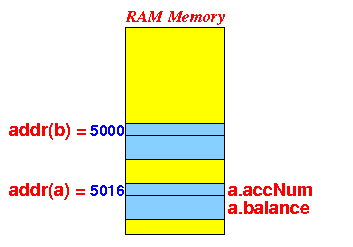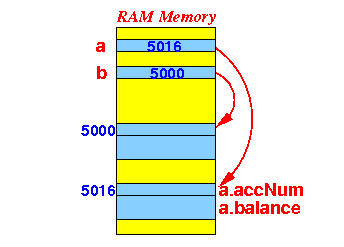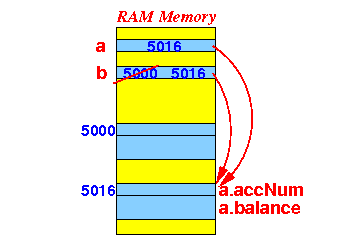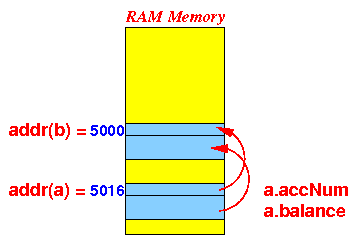- Structure:
- A structure in C is
a group of related variables
- The structure construct is the user-defined data type in the C programming language
- A structure in C is
a group of related variables
- Comparable concept
in Java:
- A structure in C is like
a class in Java
containing:
- Only public variables and
- without any methods defined inside the class
- A structure in C is like
a class in Java
containing:
- Defining
a structure
(= user-defined data type)
- Defining a structure = tell (convey) to the C compiler the make up (components) of the structure (= user-defined data type)
- Syntax to
define
a structure:
struct StructName { dataType1 member1Name ; dataType2 member2Name ; ... };Example:
/* ------------------------ Structure definition ------------------------ */ struct BankAccount { int accNum; double balance; };Note:
- A structure definition
must appear
outside
every function
(I.e., a structure is a global C programming language construct - it cannot appear inside a function definition)
- A structure definition is
similar to
a class definition
in Java that
does not contain any
methods
Futhermore: all member variables are public
So an semi-equivalent construct in Java for the above struct definition is:
public class BankAccount { public int accNum; public double balance; }
- A structure definition
must appear
outside
every function
- After
defining
a structure,
you can define
program variables
of that specific structure
(= user-defined data type).
Important note:
- The structure (data type) definition must preceed any variable definition of that structure data type !!!
-
Syntax to define structure variables:
(The structure must have been define beforehand !!!) struct StructName varName1 [, varName2, ...] ;
- Example:
/* --------------------------------------------- Structure definition This MUST preceed any variable definition of this data type !!! --------------------------------------------------------------- */ struct BankAccount { int accNum; double balance; }; struct BankAccount a; // Defines a global structure variables int main(int argc, char *argv[]) { struct BankAccount b; // Defines a local structure variables .... }Result of a structure variable definition:
- The following figure
shows the effect of the
structure variable definition
in the example:

Explanation:
- A structure variable definition
will allocate (= reserve memory space)
all components (variables)
that was specified in the
structure definition clause.
- The variable names
(a and b) will
be associated
with the
starting location of the
allocated (= reserved) memory cells
For example, in the above figure:
- The identifier b (actually: the expression &b) is equated to the value 5000 (= starting address of the components in the structure b)
- The identifier a (actually: the expression &a) is equated to the value 5016 (= starting address of the components in the structure a)
- A structure variable definition
will allocate (= reserve memory space)
all components (variables)
that was specified in the
structure definition clause.
- The following figure
shows the effect of the
structure variable definition
in the example:
- C is
very "manual":
- The programmer must make sure that the type information (such as the struct BankAccount definition is available before the definition of variables of that given data type
Consequently, a good C programmer must understand how a compiler works
(That's why I have injected information on how the C compiler works in the lecture material)
- In contrast,
Java tries very hard
to make the programmer's life easy
by doing thing for him/her....
Example:
- If Java detected that a unknown data type is used, the Java compiler will try to find the Java program file that contains the definition and include the information automatically
- This Java program
illustrate this
automatic search
I will do the demo in class
- Example Program:
(Demo above code)

- Prog file: /home/cs255001/demo/C/Java/main.java + BankAccount.java
How to run the program:
- To compile: javac main.java
- You will see that the Java compiler has also compiler BankAccount.java
- Fact:
- Using structure variables in C is very similar to using object variables in Java
- Syntax to use (= access)
a specific component of
a structure variable:
structVarName.componentNameExample:
#include <stdio.h> /* ------------------------ Structure definition ------------------------ */ struct BankAccount { int accNum; double balance; }; struct BankAccount a; // Global variable int main(int argc, char *argv[]) { struct BankAccount b; // Local variable a.accNum = 123; // Access member fields a.balance = 1000.0; b.accNum = 444; b.balance = 3000.0; printf("a.accNum = %d a.balance = %f\n", a.accNum, a.balance); printf("b.accNum = %d b.balance = %f\n", b.accNum, b.balance); }
- Example Program:
(Demo above code)

- Prog file: /home/cs255001/demo/C/set2/struct1.c
How to run the program:
- To compile: gcc struct1.c
- To run: ./a.out
- Due to the difference in
the meaning when you
define a
structure (= object) variable,
the assignment statement with
structure (= object) variable
have different effects:
- In Java, the
variable definition:
BankAccount a, b; // Define 2 reference variables to BankAccount objectsYou still need to create the BankAccount objects using:
a = new BankAccount( ); b = new BankAccount( );This diagram shows a sample result when the Java program has executed the above (2) program constructs:

The following assignment statement in Java:
b = a; // Copies a reference (address)will have this result:
- b will
reference (= point) to
the same object as
a

When you update a.balance, the variable b.balance will now also change because a and b points to the same object
- b will
reference (= point) to
the same object as
a
- In contrast,
in C, the
variable definition:
struct BankAccount a, b; // Define 2 BankAccount objects !!!This diagram shows a sample result when the C program has executed the above program construct:

In contrast, the following assignment statement in C:b = a; // Copies an object !!!will have this result:
-
We will
copy
all fields in
structure (= object) a into
the structure (= object) b

When you update a.balance, the variable b.balance will not change because a and b are different object
-
We will
copy
all fields in
structure (= object) a into
the structure (= object) b
- In Java, the
variable definition:
- Java and C Programs
to show the
difference in the above
behavior:
struct_copy.java struct-copy.c class BankAccount { int accNum; double balance; }; public class struct_copy { public static BankAccount a; public static void main(String[] argv) { BankAccount b; a = new BankAccount( ); // Create the objects b = new BankAccount( ); a.accNum = 123; a.balance = 1000.0; b.accNum = 444; b.balance = 3000.0; System.out.printf("a = (%d, %f)\n", a.accNum, a.balance); System.out.printf("b = (%d, %f)\n\n", b.accNum, b.balance); /* ======================== Copy object reference ======================== */ b = a; System.out.printf("a = (%d, %f)\n", a.accNum, a.balance); System.out.printf("b = (%d, %f)\n\n", b.accNum, b.balance); /* ============================================ Proof that a and b are the SAME object ============================================ */ a.balance = 999999.0; System.out.printf("a = (%d, %f)\n", a.accNum, a.balance); System.out.printf("b = (%d, %f)\n\n", b.accNum, b.balance); } }#include <stdio.h> /* ------------------------ Structure definition ------------------------ */ struct BankAccount { int accNum; double balance; }; struct BankAccount a; int main(int argc, char *argv[]) { struct BankAccount b; a.accNum = 123; a.balance = 1000.0; b.accNum = 444; b.balance = 3000.0; printf("a = (%d, %f)\n", a.accNum, a.balance); printf("b = (%d, %f)\n\n", b.accNum, b.balance); /* ======================== Copy struct ======================== */ b = a; printf("a = (%d, %f)\n", a.accNum, a.balance); printf("b = (%d, %f)\n\n", b.accNum, b.balance); /* ============================================ Proof that a and b are different objects ============================================ */ a.balance = 999999.0; printf("a = (%d, %f)\n", a.accNum, a.balance); printf("b = (%d, %f)\n\n", b.accNum, b.balance); }
The output of the Java program struct_copy.java is:
a = (123, 1000.000000) b = (444, 3000.000000) a = (123, 1000.000000) b = (123, 1000.000000) After we update a.balance = 999999.000000: a = (123, 999999.000000) b = (123, 999999.000000) // b.balance is also changed !!
This shows that a and b points to the same object
The output of the C program struct-copy.c is:
a = (123, 1000.000000) b = (444, 3000.000000) a = (123, 1000.000000) b = (123, 1000.000000) After we update a.balance = 999999.000000: a = (123, 999999.000000) b = (123, 1000.000000) // b.balance is unchanged !!
This shows that a and b are different objects